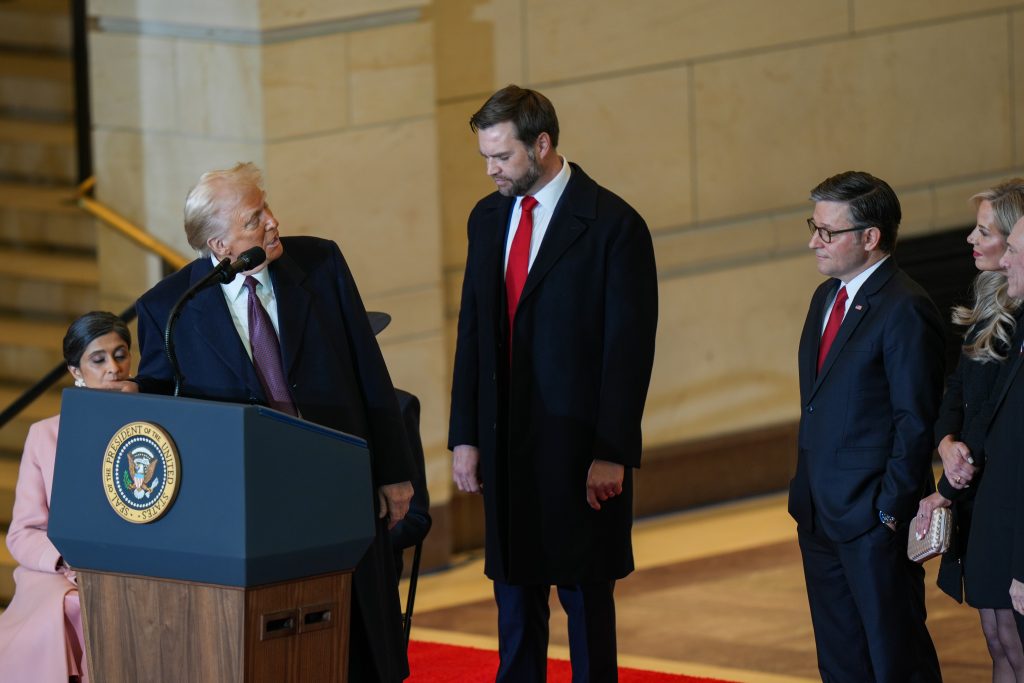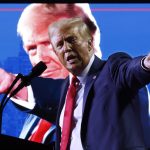President Donald Trump prodded congressional leaders to consider recess appointments for his top nominees and expressed interest in trading California wildfire aid for a debt limit increase in a White House meeting Tuesday — resurfacing two controversial proposals floated during the returning president’s transition.
The discussions, which were described by two people granted anonymity to describe the private talks, also touched on his proposal to exempt at least some tip income from federal taxes and his efforts more generally to extend tax cuts.
Trump described wanting to use wildfire aid as a bargaining chip in comments to reporters shortly after the meeting: “They’re going to need a lot of money, and generally speaking I think you will find that a lot of Democrats are going to be asking for help. So I think maybe that makes it more one-sided. I think we’re going to do very well.”
Meanwhile, inside the meeting, Trump emphasized the need for Republicans to stick together as a party: “The one thing the Democrats have going for them is they stick together,” one of the people familiar with the meeting said, paraphrasing Trump’s message. “No grandstanding — just stick together and deliver and we will win.”
Trump’s controversial pardons of Jan. 6 riot offenders did not come up, Speaker Mike Johnson said in an interview after the meeting. “It didn’t come up today,” he said.
The talks also touched upon a crucial and still unsettled strategy choice: whether to package the GOP’s policy agenda in one big bill or break it up into two — a question dividing House and Senate Republicans.
Trump reiterated his preference for one massive bill, to be passed through the party-line reconciliation process, but that did not change the status quo: House Republicans will continue to push their one-track strategy, while Senate Republicans will ready a two-bill backup.
In a sign of the ongoing clash, House Majority Leader Steve Scalise said the one-bill strategy was settled, while Senate Majority Leader John Thune left the door open to his chamber’s alternative.
“There are a lot of great theories, but it’s always different when you have to translate that into practice,” Thune said.
The recess appointments push first surfaced last year after the election, when it appeared that several of Trump’s Cabinet appointments could get snarled in the Senate. Recess appointments could allow some nominees to take office at least temporarily without a confirmation vote.
But talk of using the dormant power has ebbed as Trump’s nominees, such as Defense pick Pete Hegseth, improved their standing with Republican senators. But Trump raised it anew as an option in a smaller Oval Office session with Johnson, Thune and Vice President JD Vance.
One of the people who described the meeting said Trump expressed confidence in how Thune had handled his nominees so far but said recess appointments could be a possible “break glass” option if some bog down.
Speaking to reporters after the meeting, Thune didn’t embrace Trump’s push for recess appointments, though he acknowledged that the president has been interested in the idea.
“I think we’re going to find out here pretty quickly whether or not the Democrats want to help us get through some of these nominations in a way that gets us back on track with the way it was done prior to the last two presidencies,” he said, referring to an “Obama standard” for the pace of confirmations.
As for the fire-aid-for-debt-limit trade, GOP lawmakers who first raised the idea with Trump at recent Mar-a-Lago meetings said he was interested in the prospect at the time. That would mean making a debt limit hike part of a larger agreement around the bipartisan government funding talks.
Rep. Kevin Hern (R-Okla.), who attended the meeting as GOP policy chair, said Trump was agnostic on how a debt deal got done, so long as it gets done: “He’s leaving this up, and rightfully so, to the leader and to the speaker, to however they can move it best through their respective ends of the Capitol.”
The wider House and Senate GOP leadership teams met with Trump for more than a hour Tuesday as they tried to hash out the way forward on his early agenda.
Johnson and Thune want sign-offs from Trump on a series of key decisions on the Republican agenda. GOP leadership and Trump’s team held several calls this past weekend during which they tried to form more of a consensus on the way forward before the Tuesday meeting.
They want Trump to make play calls on some of their biggest intra-party fights, including how to move a sweeping tax policy bill, what to do about the swirling debt limit fight and how to handle the mid-March government funding deadline.
Getting Trump’s blessing for how to tackle the fiscal battles could help Johnson mollify his hard-liners, unify his thin conference and satisfy growing concerns that he’s losing precious time to get going. Johnson has struggled to unite his conference, where he has a one-vote margin.
At the same time, having Trump articulate what he wants also lowers the risk that Johnson or Thune find themselves at odds with the leader of their party if they were to outline their own strategy just to have Trump disagree with it. Thune found himself in that position after he laid out his plan for a two-bill reconciliation only for Trump to embrace one bill, while leaving the door open for two.
But Trump himself frequently admits he doesn’t care how GOP leaders accomplish his vast legislative agenda — just that they do it, and quickly. One senior Republican noted Trump in a recent interview appeared to confuse reconciliation with the government funding process, by arguing Republicans could add wildfire aid to the GOP party-line bill in order to secure some Democratic votes.
And some Senate Republicans are already acknowledging that ultimately much of their strategy will be what can get through the House.
“The Senate and the House are two very different bodies. And on the Republican side, in both the House and Senate, we both have free-range chickens that wander off but frankly ours are easier to catch than the House,” said Sen. John Kennedy (R-La.), who said he’s spoken to Johnson and House Majority Leader Steve Scalise (R-La.).
Nicholas Wu and Irie Sentner contributed to this report.







